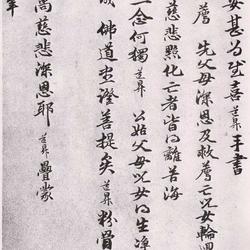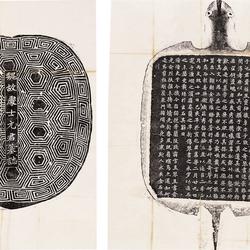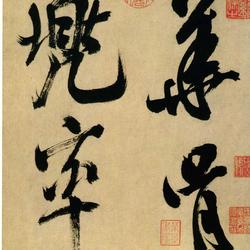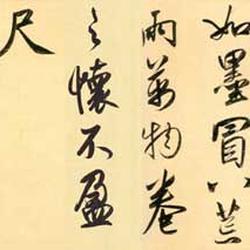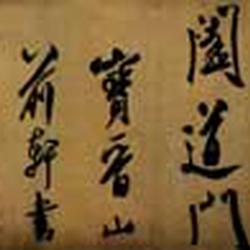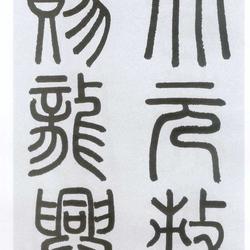Zhao Mengfu's "The Biography of Han Ji'an", Song Dynasty light yellow Tibetan scripture paper, small regular script, 10 pages in total, each page is 17.6cm long and 17.4cm wide, with black silk borders, 12 lines per page, and the number of words in the lines ranges from 16 to 18 , 119 lines, totaling 1946 words, 12 lines and 197 words on page 6, supplemented by Wen Zhengming. Successively through Yuan Yu, Xiang Yuanbian, Xiang Huifu and his son, Li Zongkong (1618-1701), Bian Yongyu (1645-1712), An Qi, Qian Weiqiao (1739-1806), Tang Zuomei, Bao Guisheng, Sun Yuwen (1833) -1899) Sun Mengyan and his son, Fei Jingfu (1854-1936). At the back of the volume are the postscripts of Wen Zheng in the 20th year of Jiajing reign of Ming Dynasty (1541), when he was 72 years old, the postscripts of Xiang Yuanbian in the third year of Wanli reign (1575), which were compiled into the ancestral name, the postscripts of Da Chongguang in the 26th year of Kangxi reign (1687), and the postscripts of Feng Yuji in the 10th year of Tongzhi period. The postscript of the second year (1873), the postscript of Bao Yuanshen (1812-1884), the twelfth year of Tongzhi, and the postscript of Sun Mengyan, the twenty-fifth year of Guangxu (1899). The ink ink of "The Story of Ji An" is now in the collection of the Hosokawa Iesei Library in Tokyo, Japan. In 1941, there was a short review by Takizhuoan on pages 317-325 of Volume 10, Volume 51, of the Japanese magazine "Kuohua", but there was no further in-depth research by Japanese scholars.
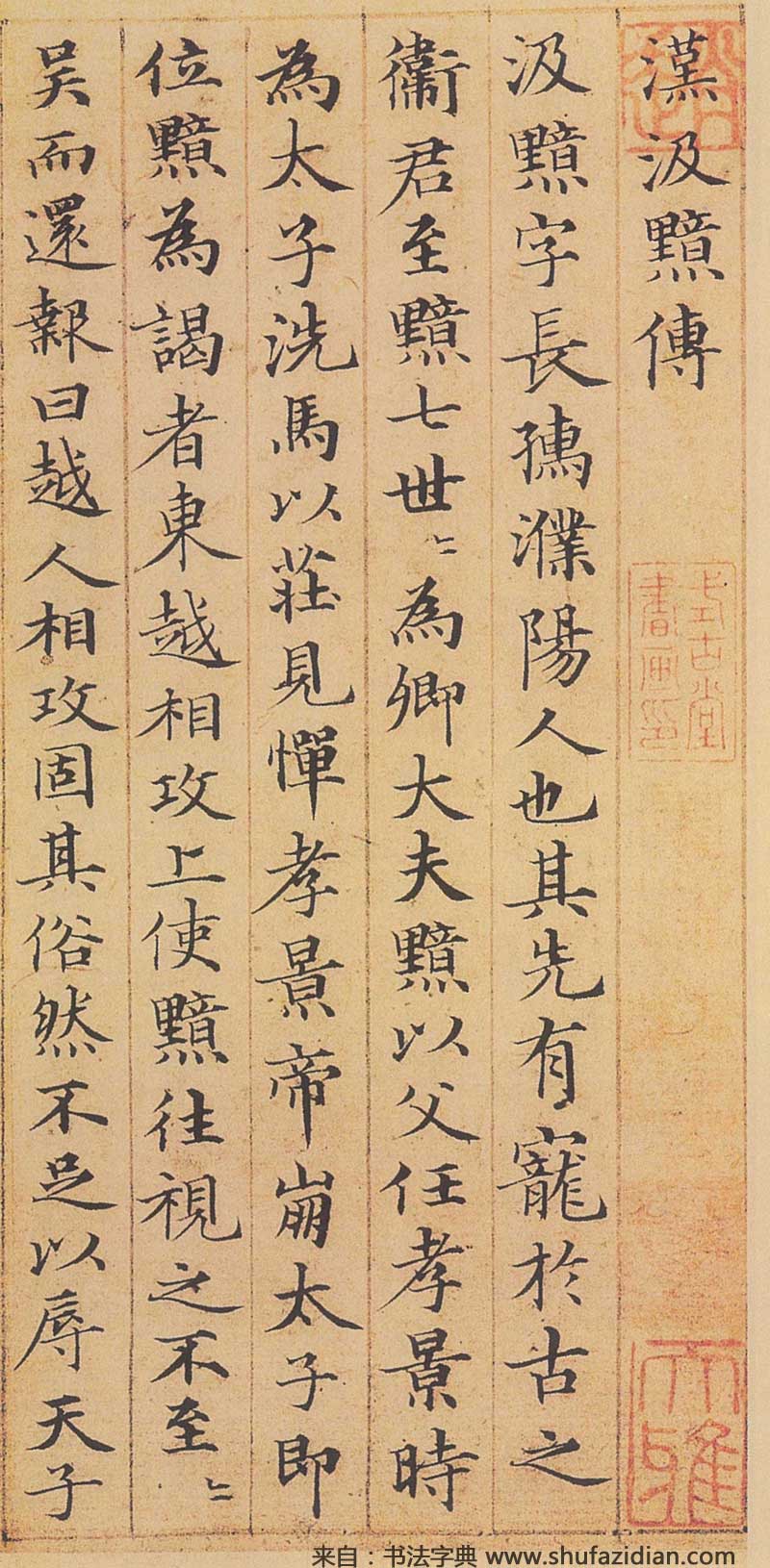
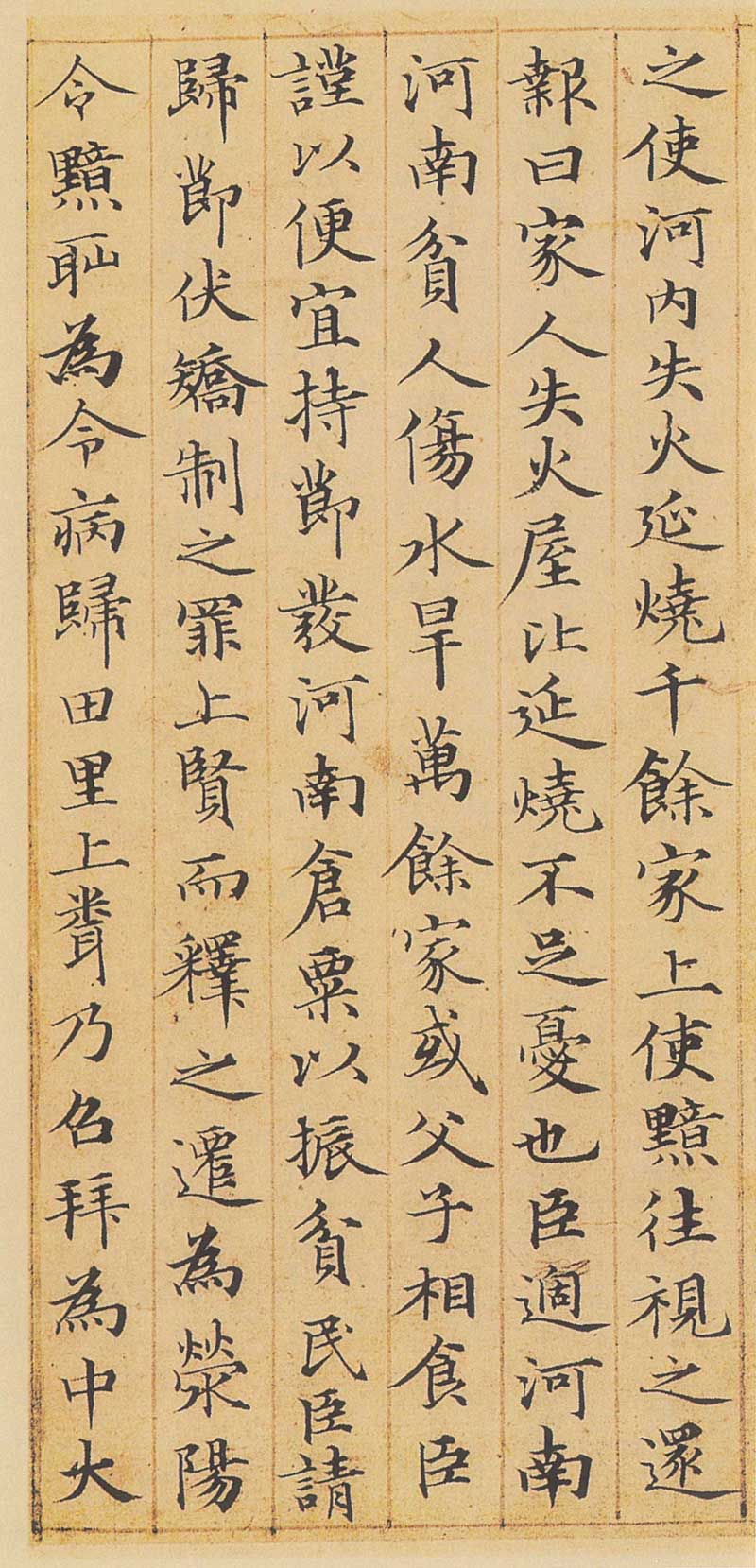
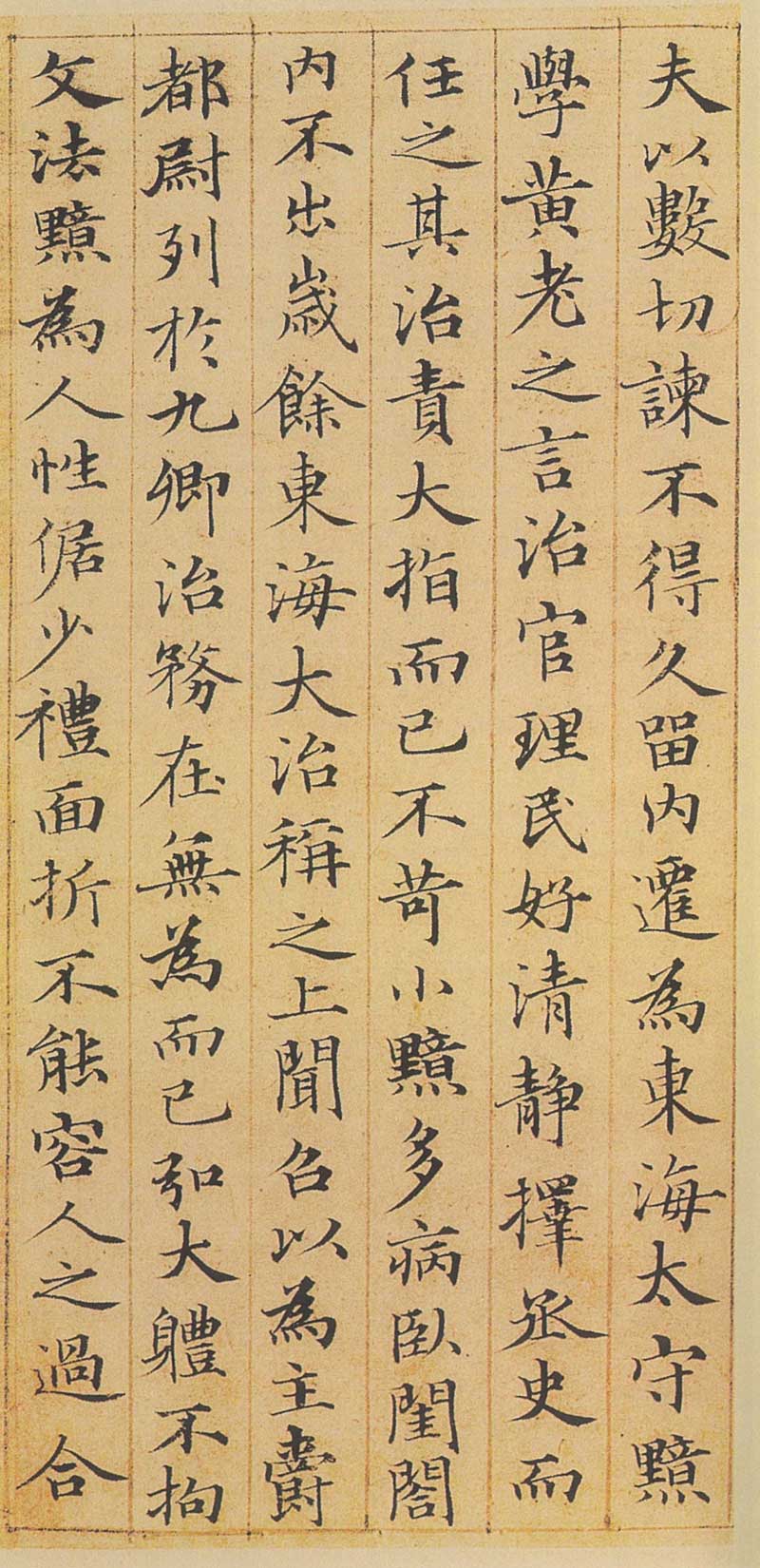
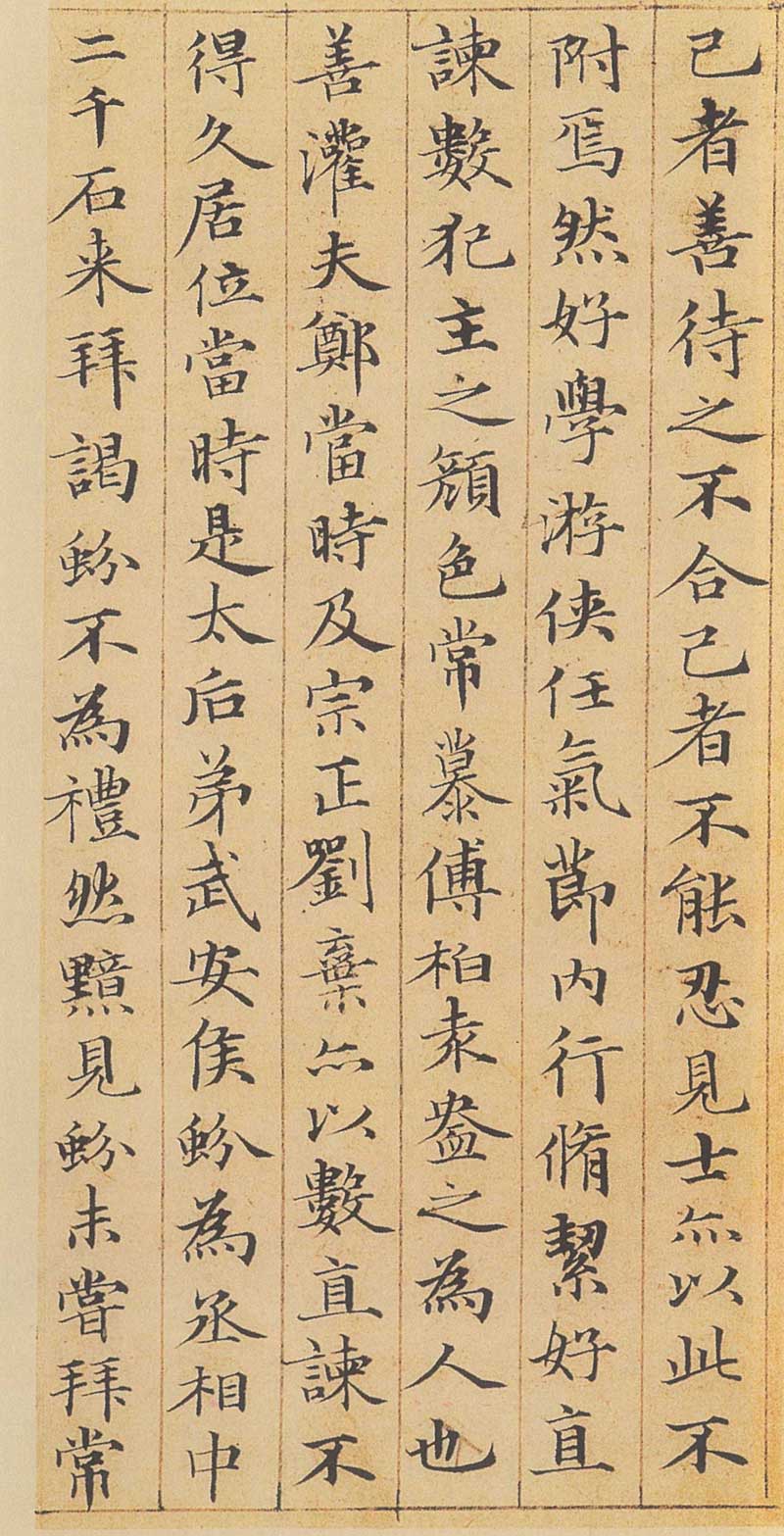
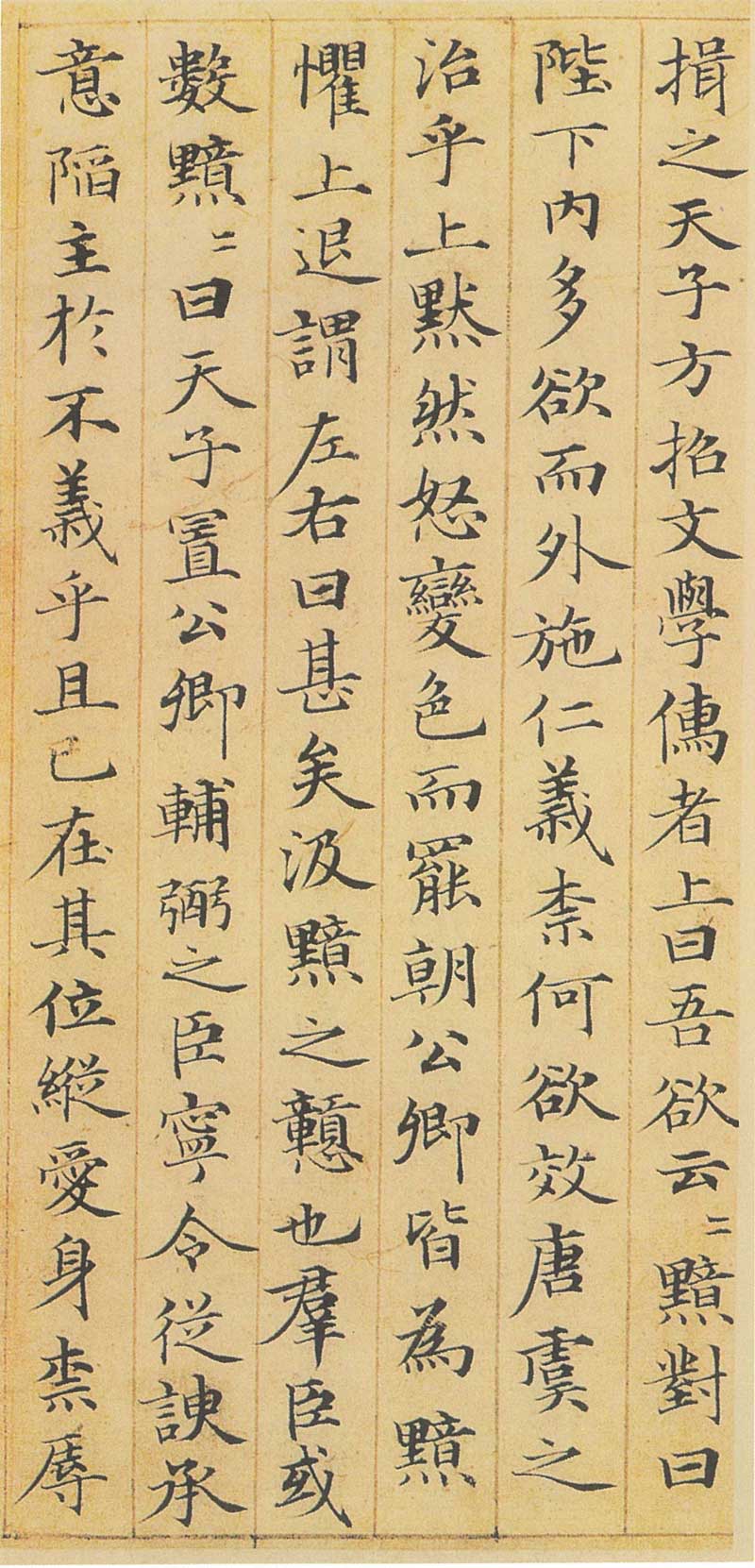
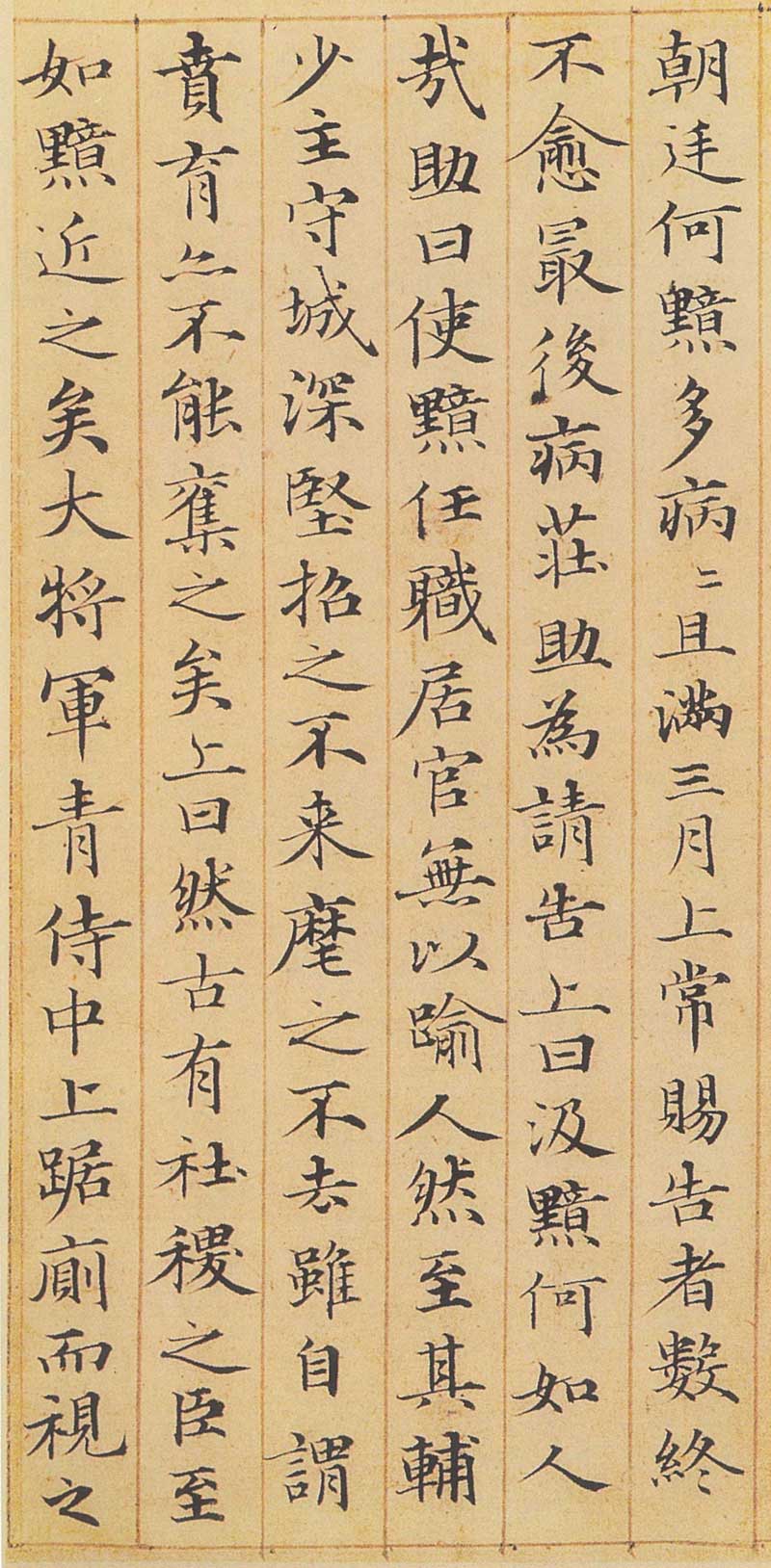
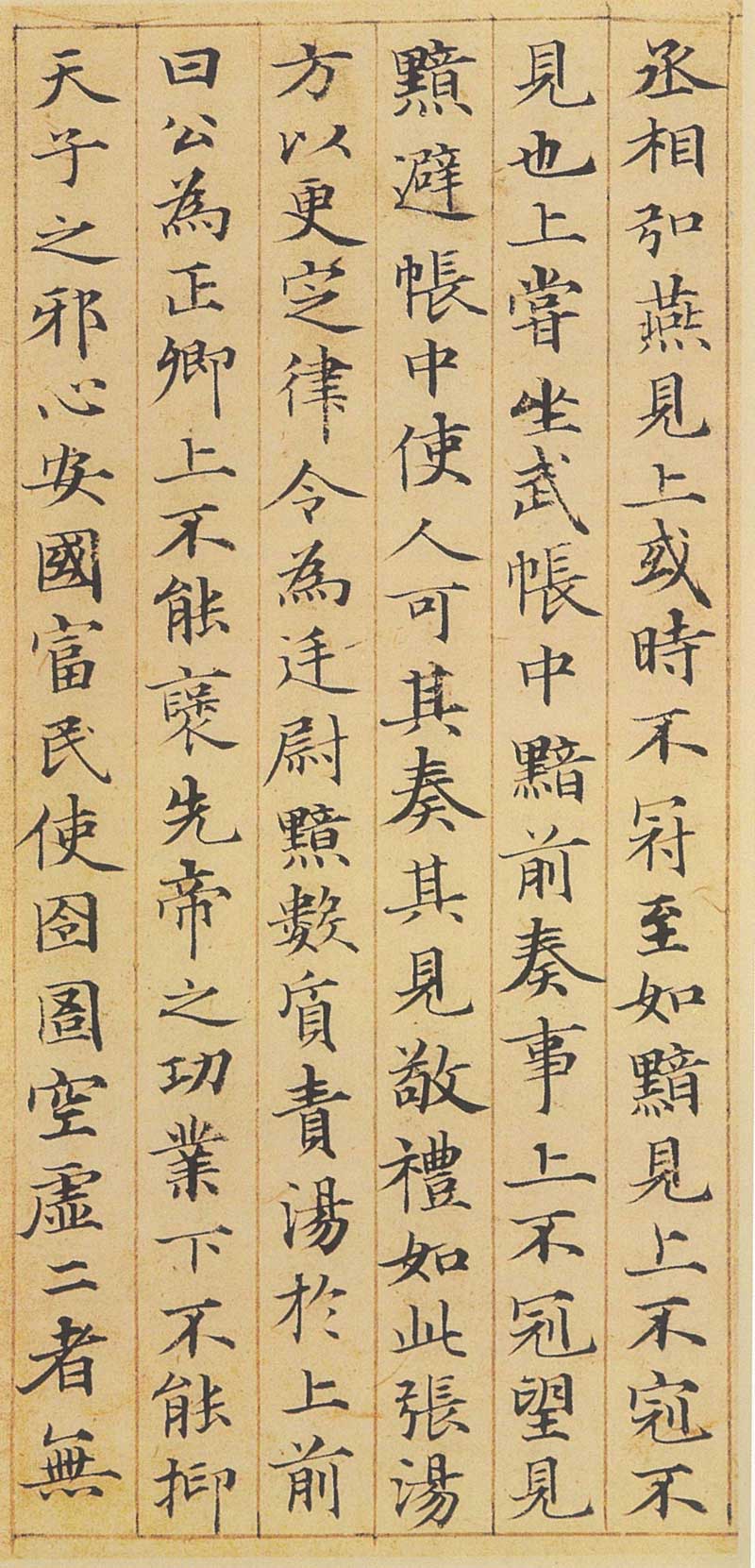
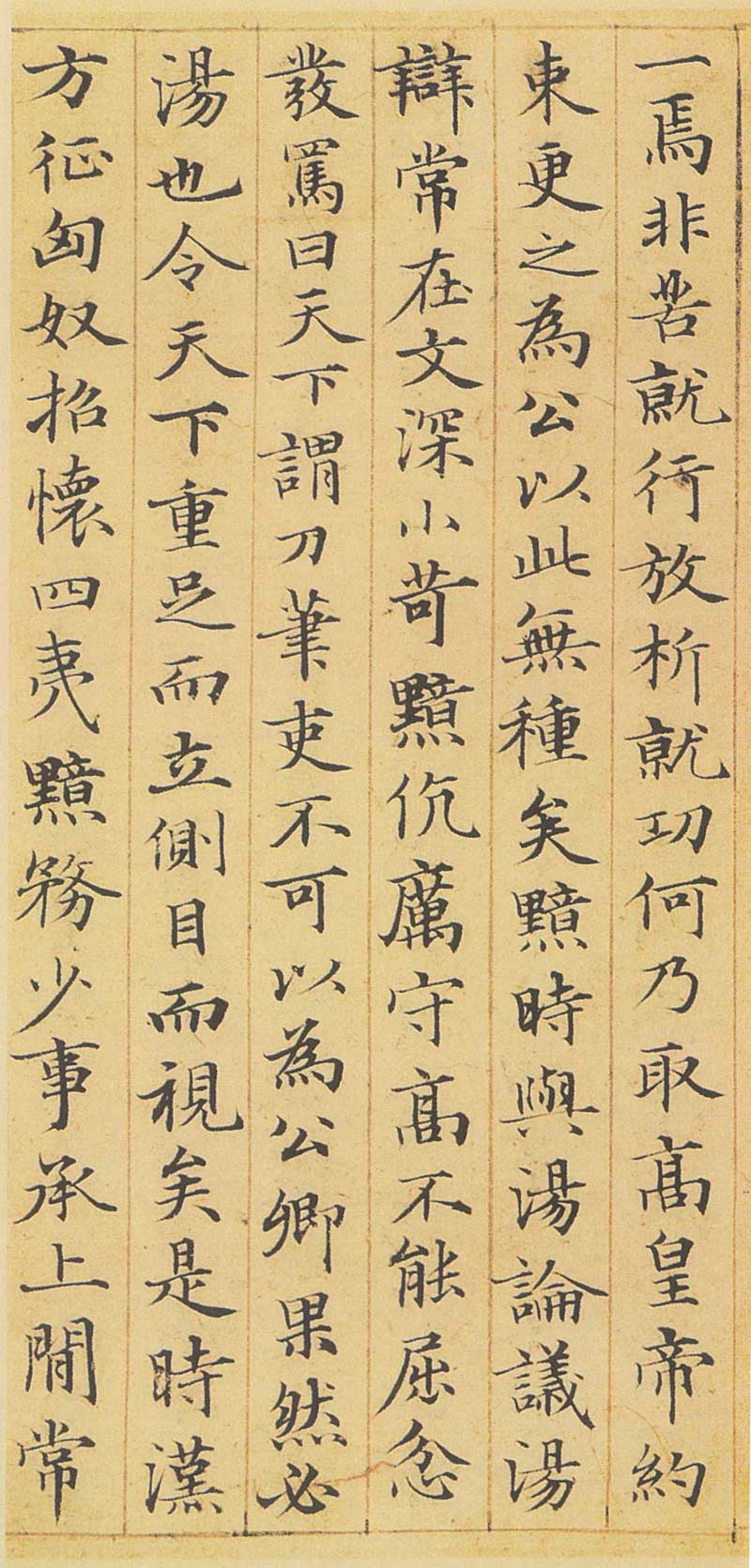
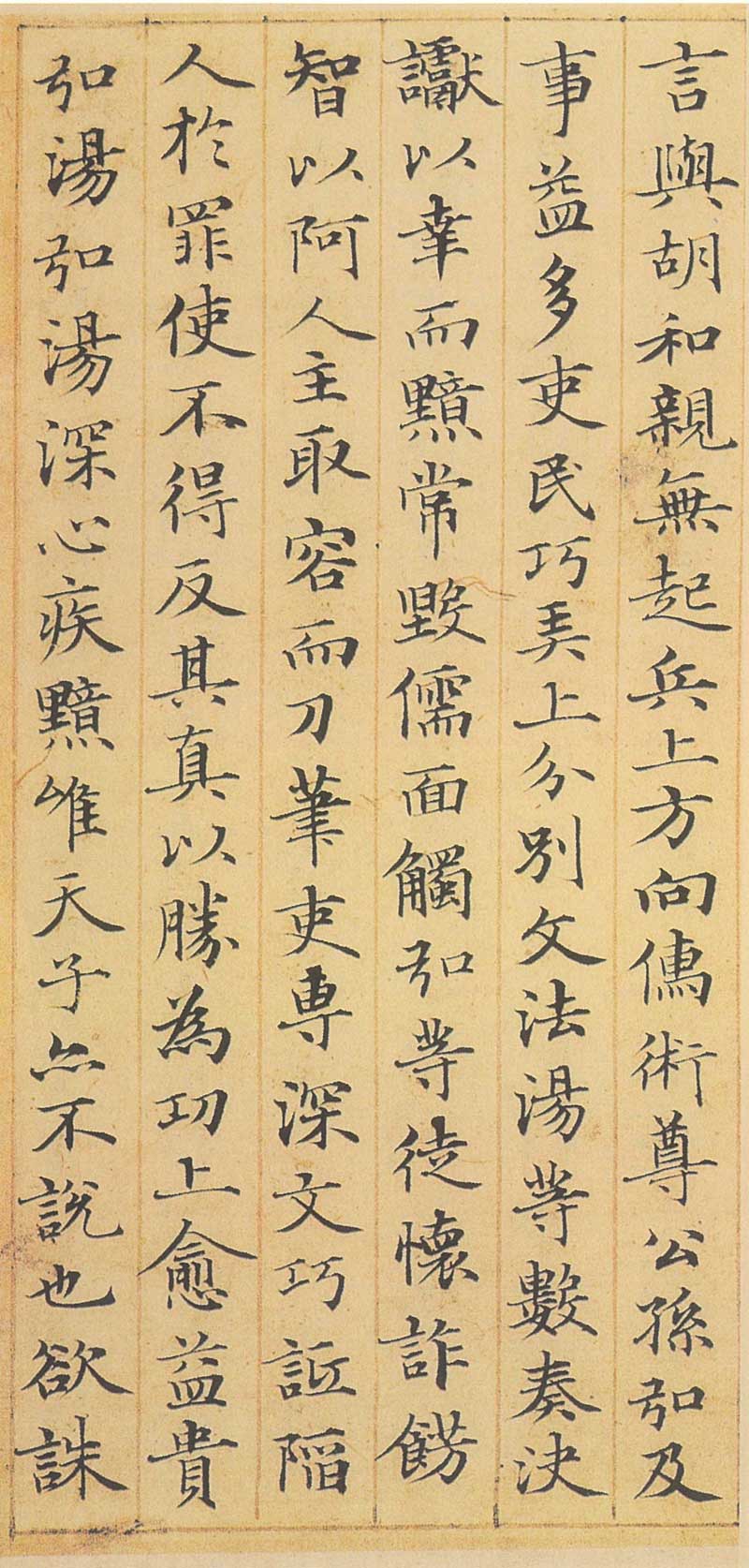
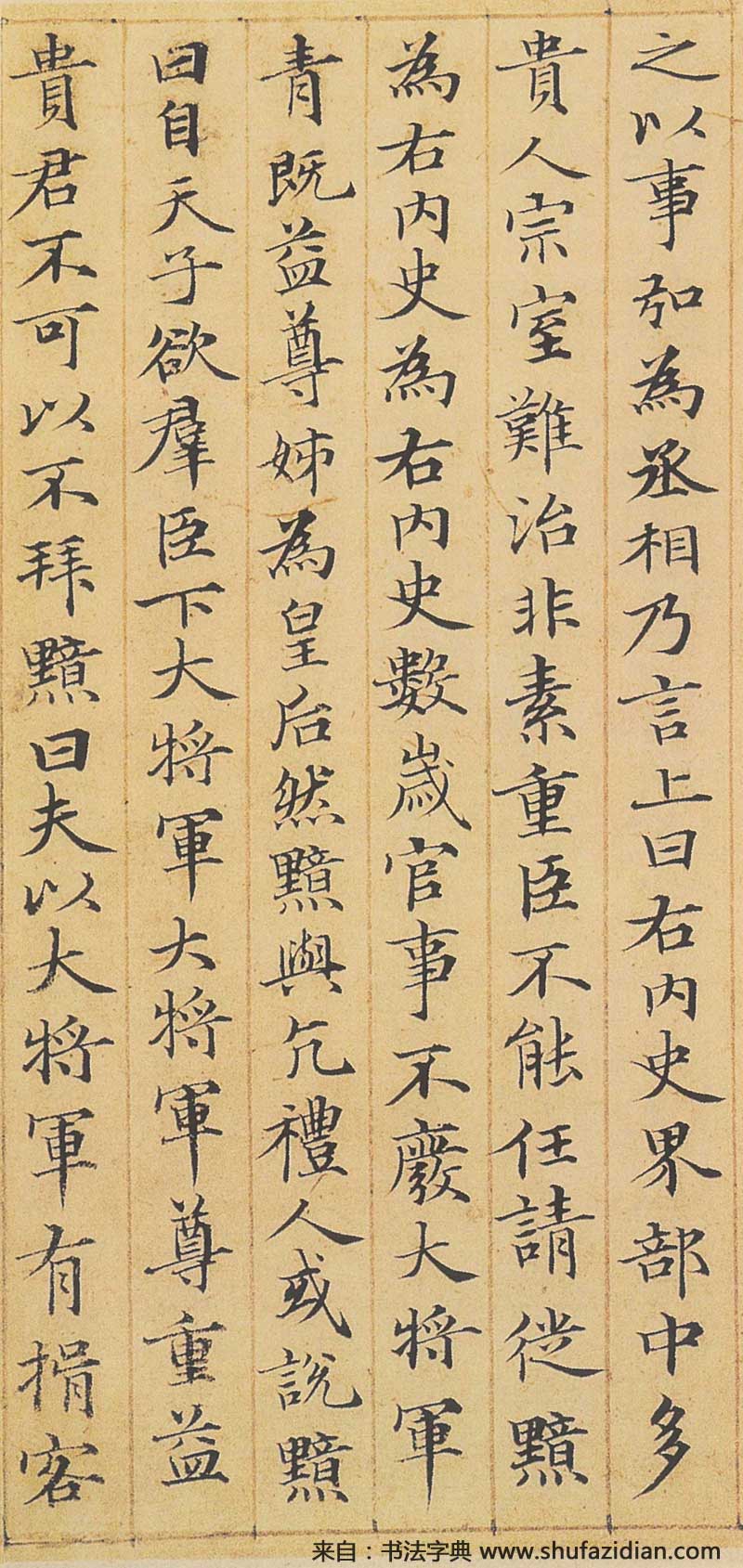
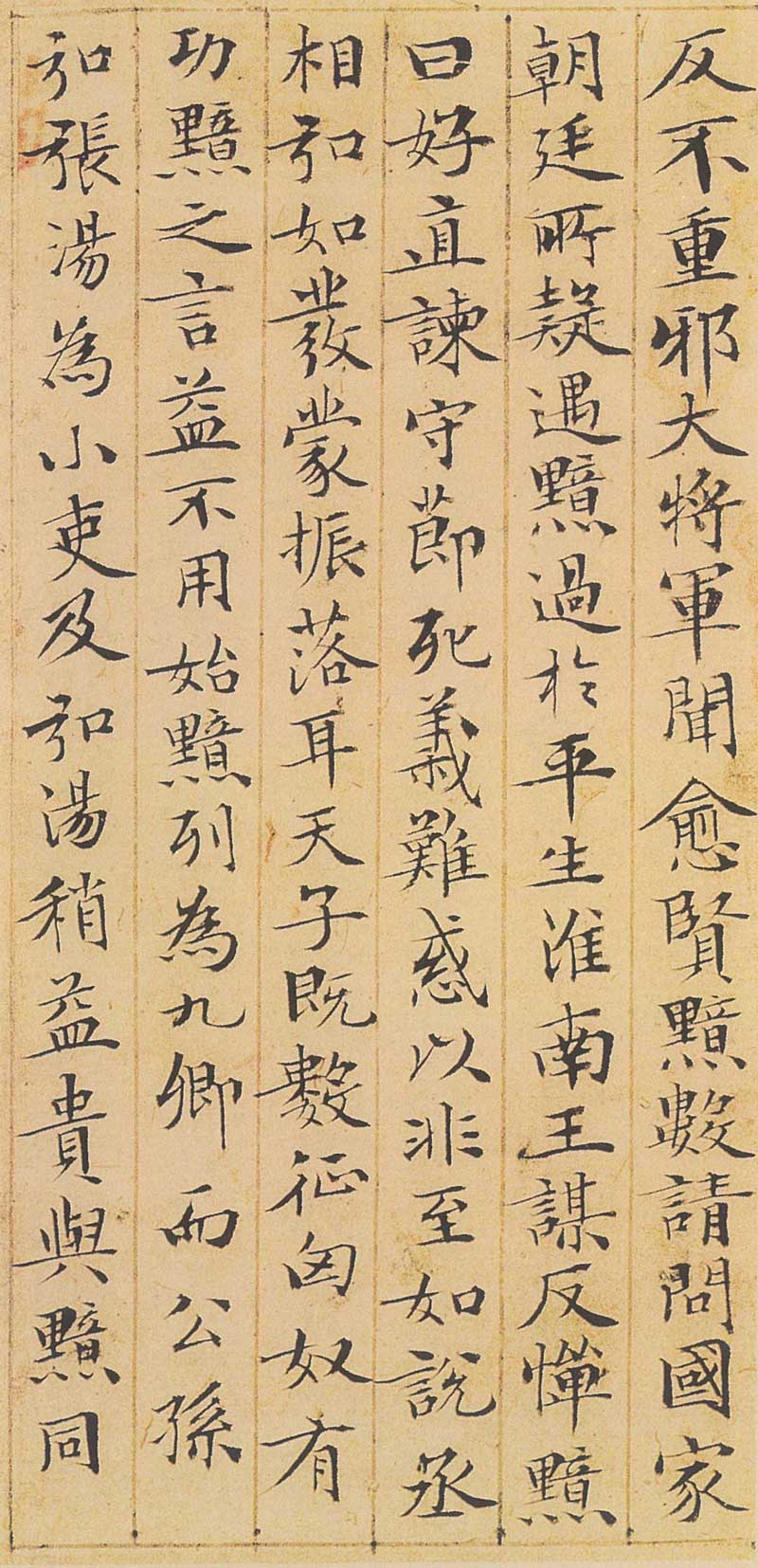
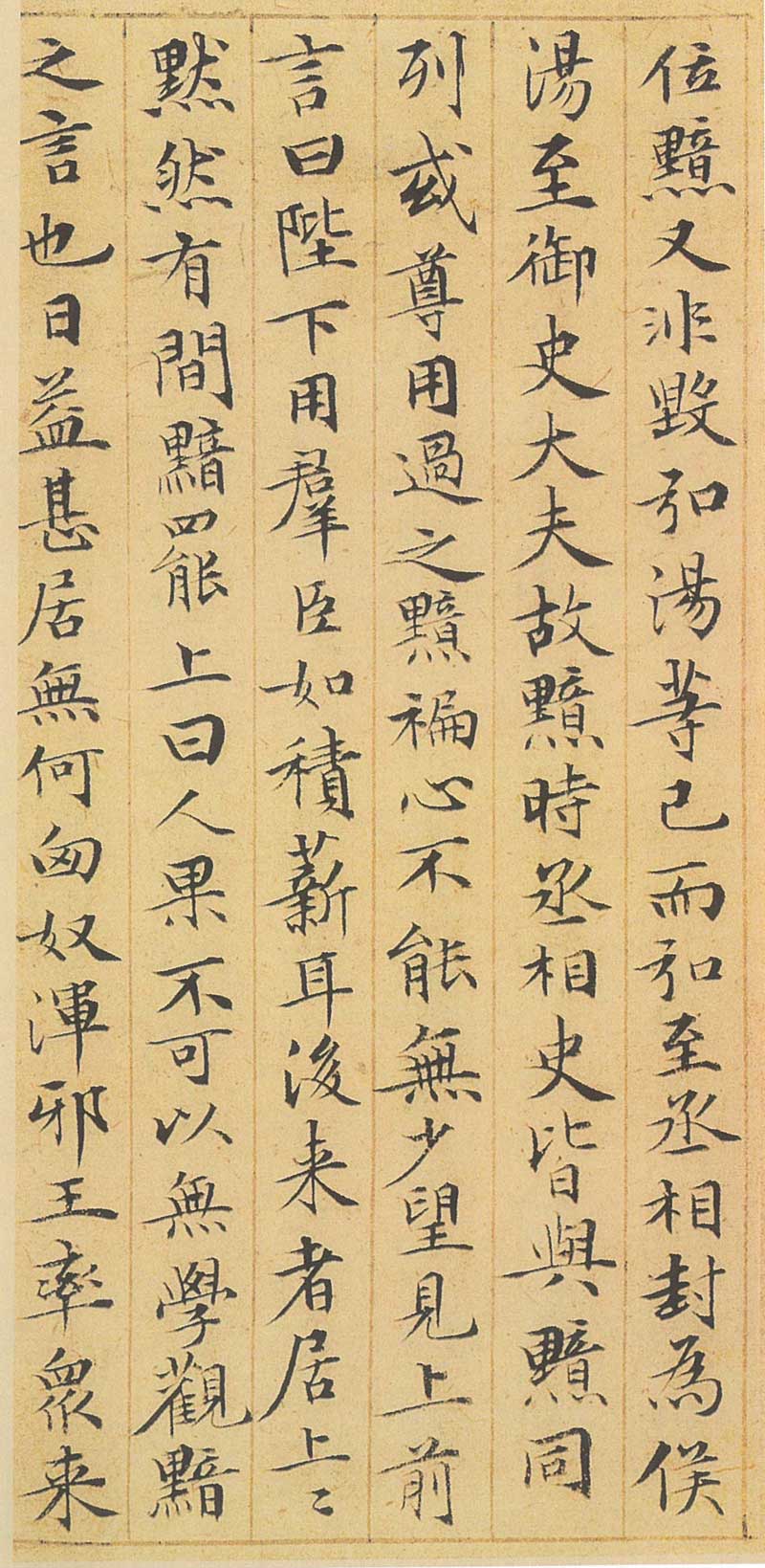
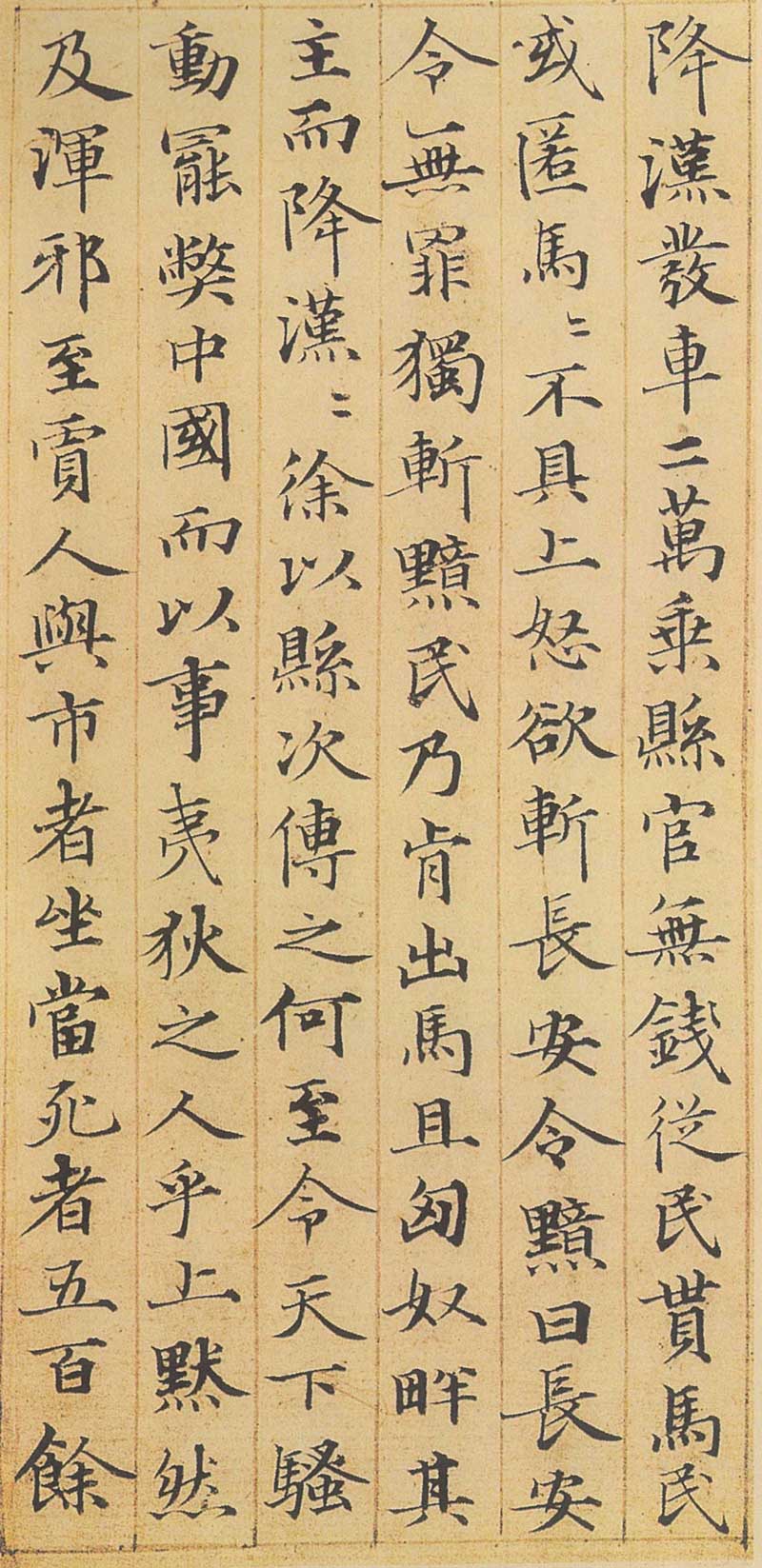
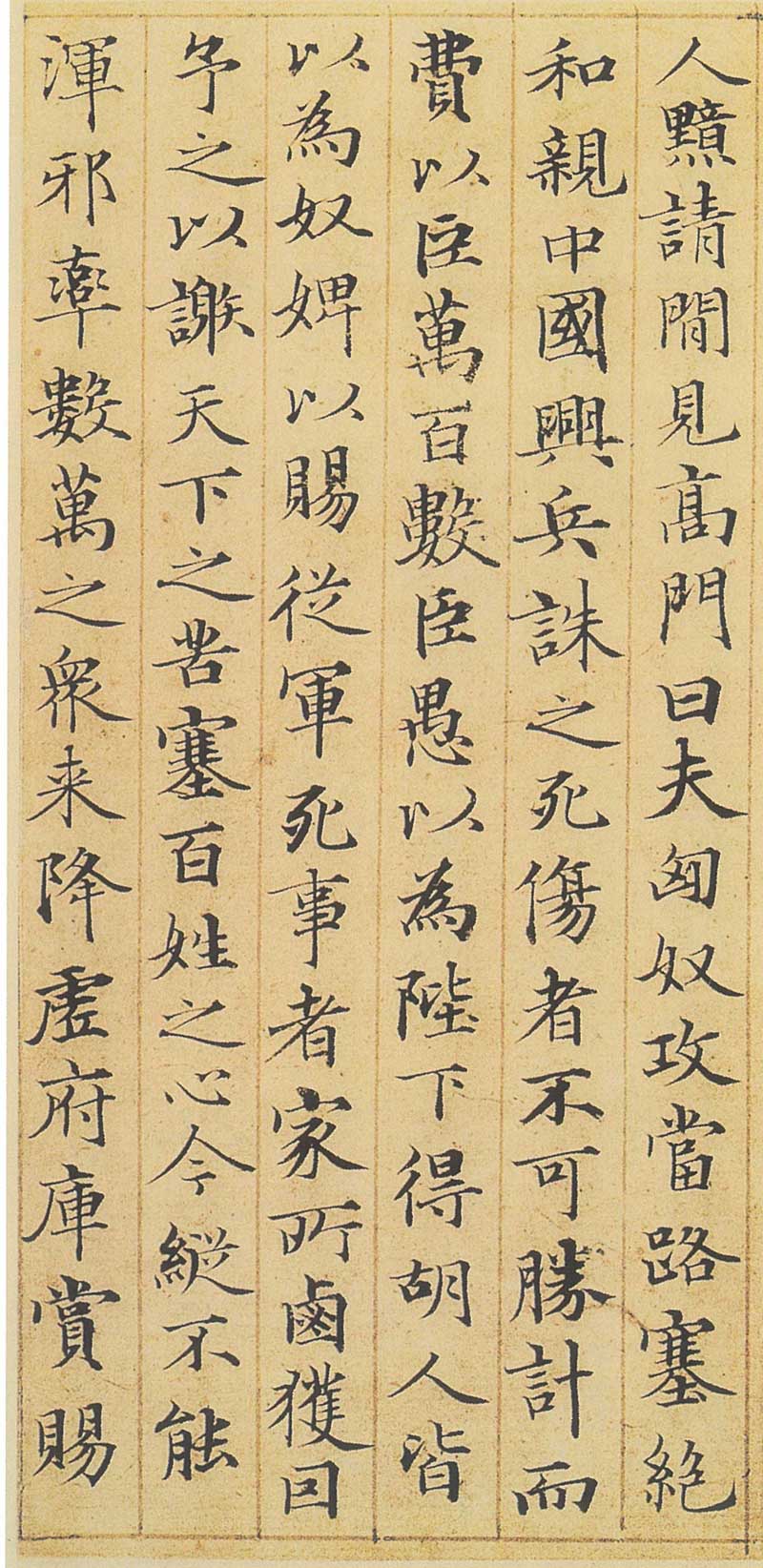
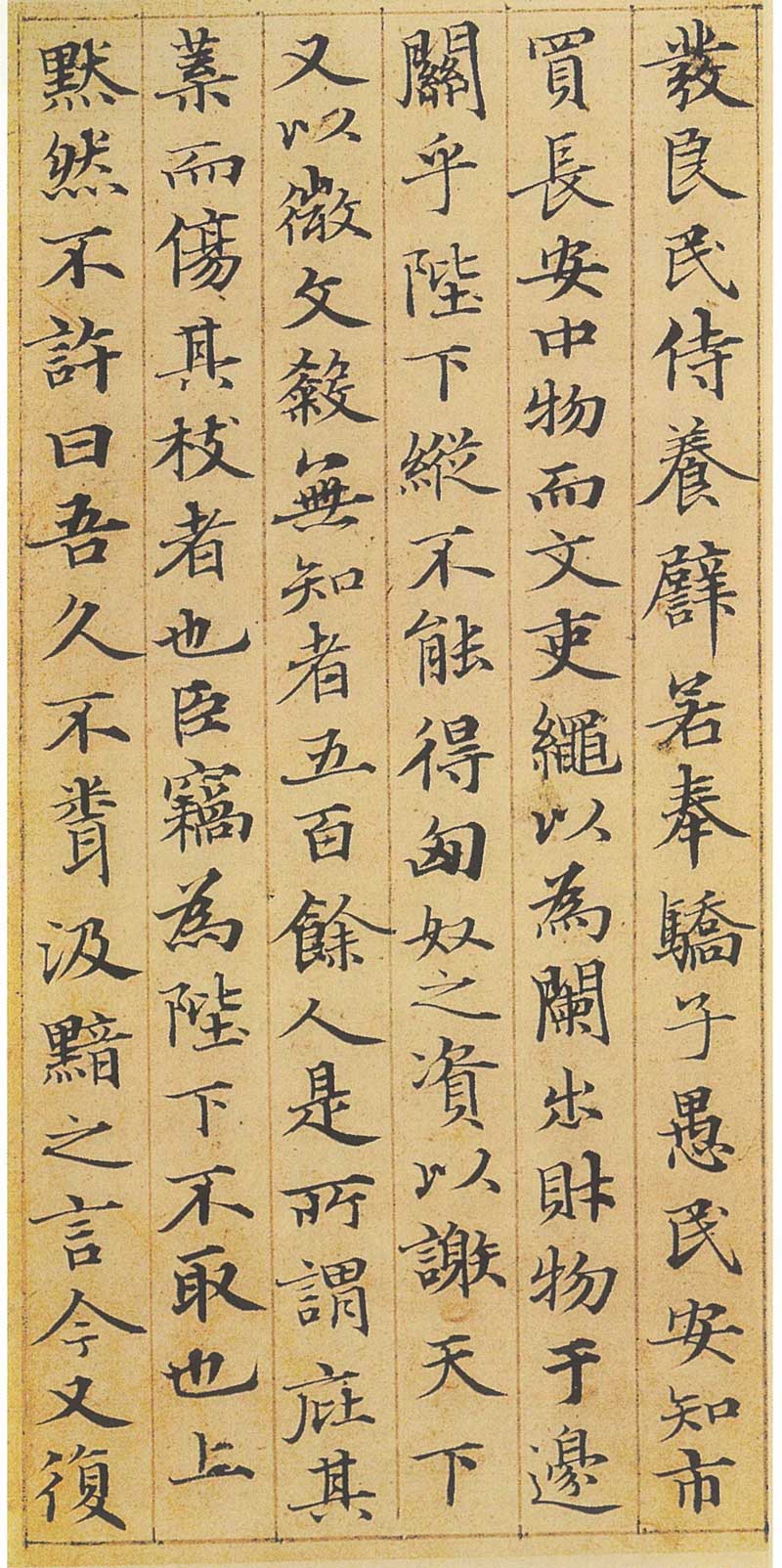
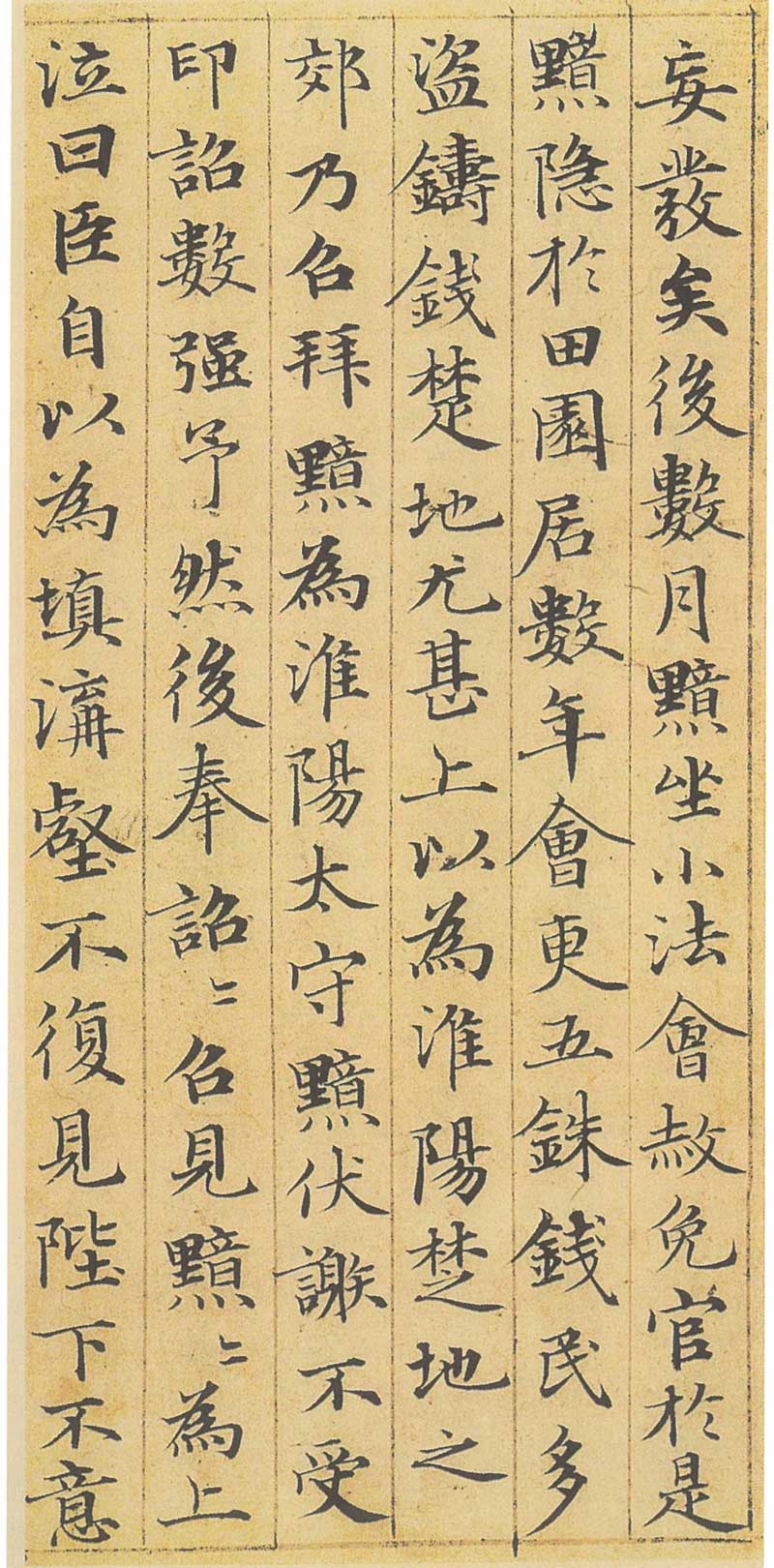
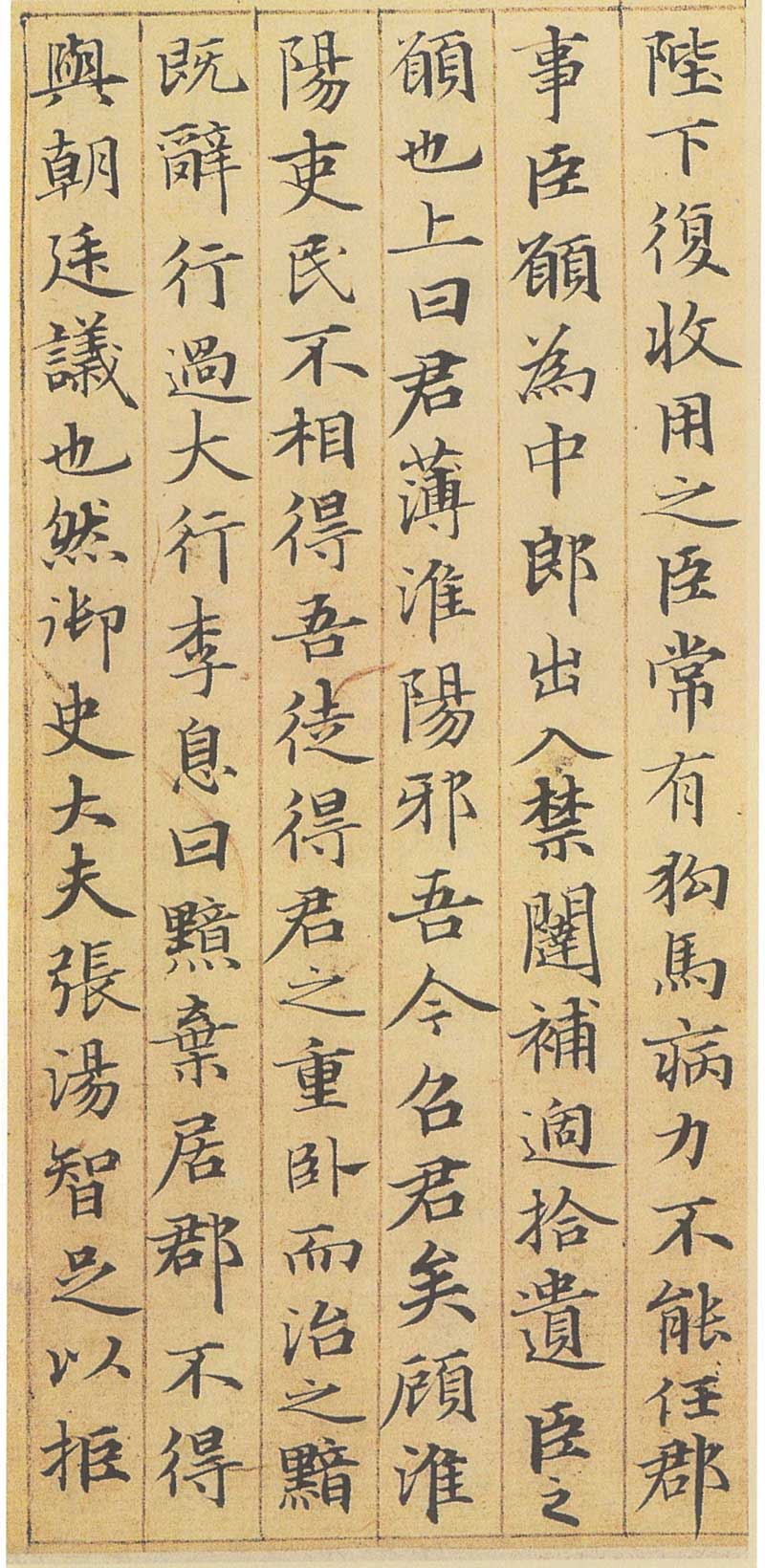
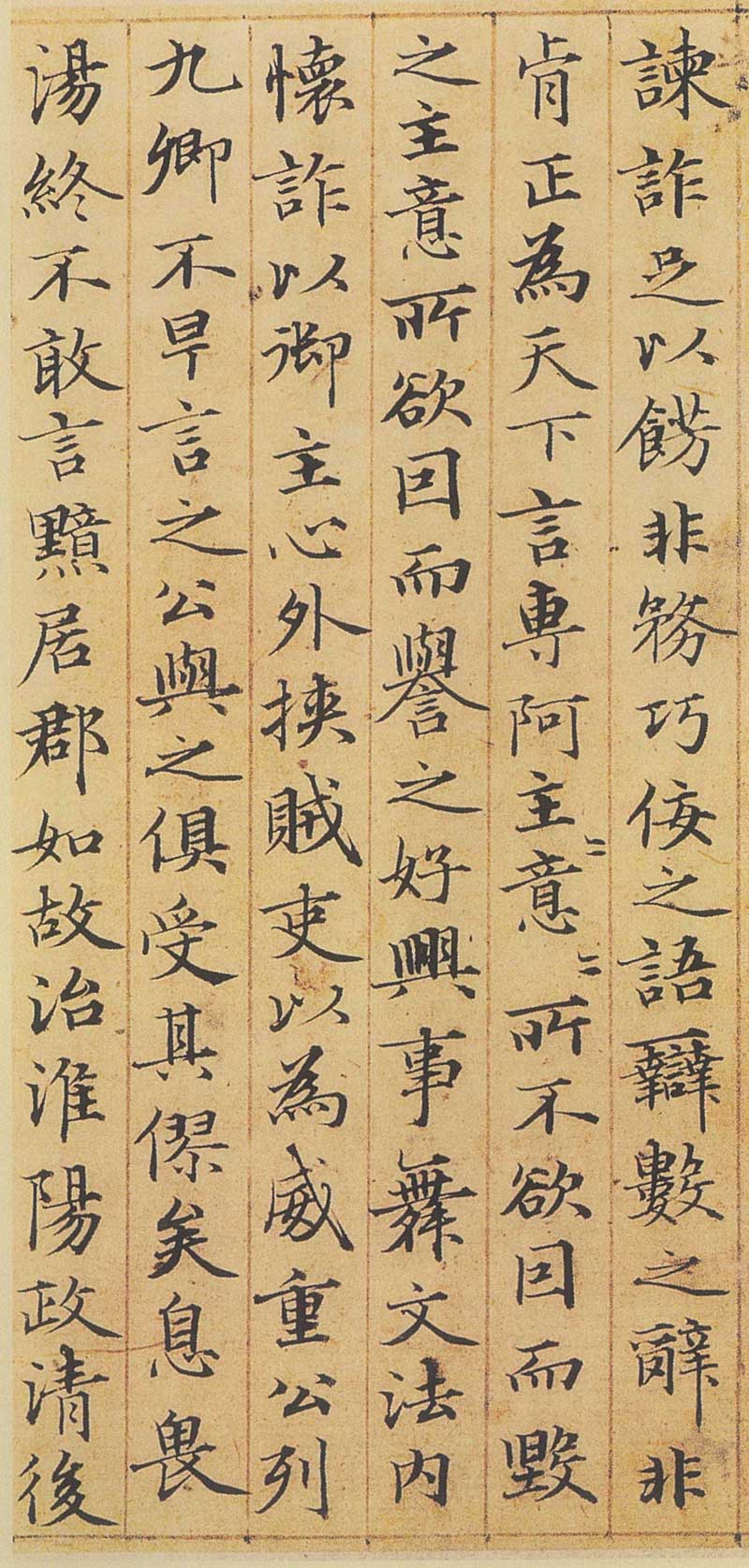
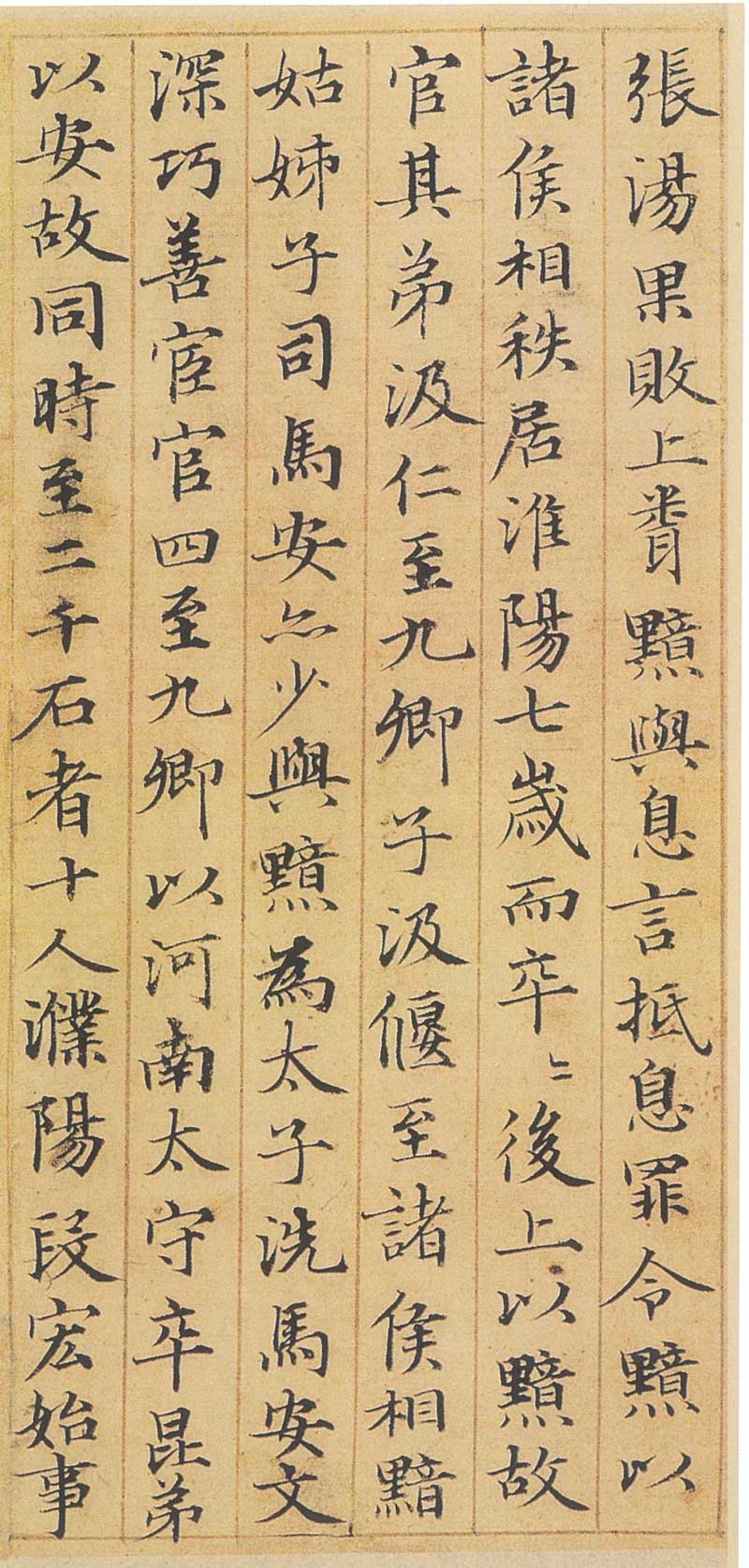
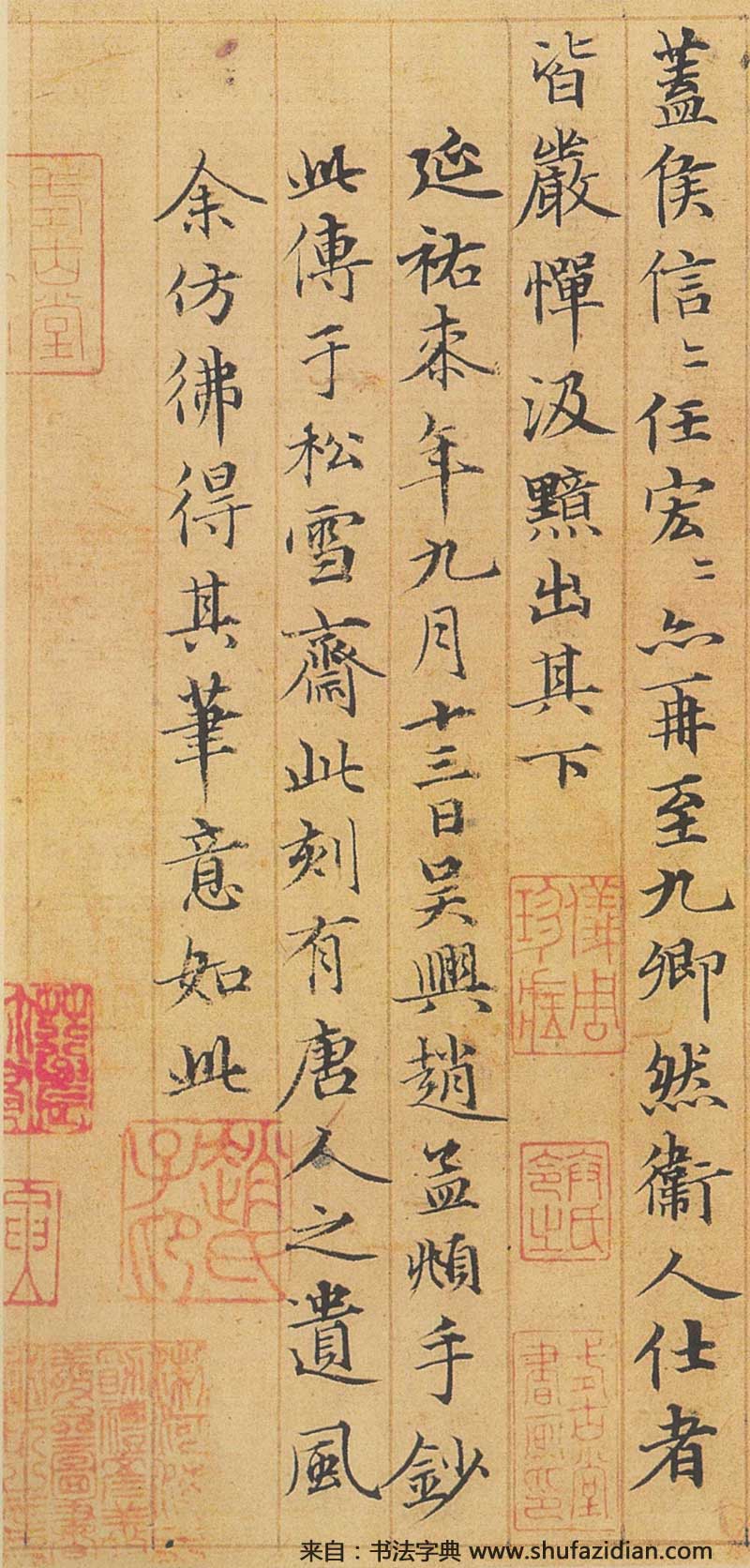
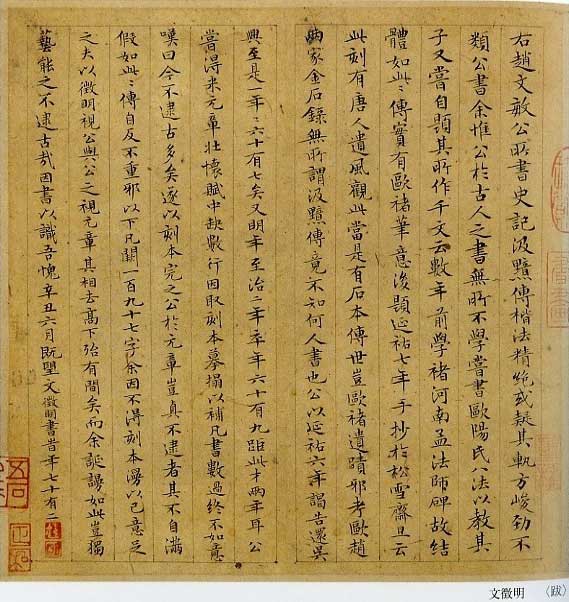
Zhao Mengfu "Han Ji'an Biography" volume (biography), small regular script, paper, black silk column, 17.6×17.4cm×10, 1320, collected by Eisei Bunko, Tokyo, Japan
This work is a masterpiece among Zhao Mengfu's handed down small regular script calligraphy works. Compared with his other small regular script works such as "Tao Te Ching", this work is serious and elegant in its starting point, without any flirtatiousness or tadpole stupidity, and the weight is appropriate; It is not as graceful and delicate as it is soft. Although it is sharp and sharp, it does not lose its gentleness. The closing of the pen seems to be a little heavy, but it shows that the brushstrokes are meticulous. The bent pen is turned calmly, condensing and connoting; the folded pen is straight and square, the workmanship is elegant and quiet. The vertical strokes are both heavy and heavy, and the other strokes are sparse and light, interspersed among them, like sparse branches and dense leaves in a green bush, with the moonlight shining through, creating an interesting scene. Although the dots are small, they are quite impressive. Either left or right, up or down, they can all show off their own postures. They can be as heavy as a rock falling from a mountain, or as light as a speck of dust blowing in the wind. The rows are limited to red silk on both sides, and the rows run straight to the left and right in harmony, but not horizontally. Instead, they complement each other and complement each other. Zhao Mengfu claimed that "The Biography of Ji An" has the style of writing inherited from the Tang Dynasty. Feng Yuanshen in the Qing Dynasty commented: "This book is square and sharp. Although it is based on the European style, the quickness and gracefulness of its writing can still be derived from the books "Praise of Painting" and "Le Yi"." Ni Zan also said: "Zi Ang Xiaokai, with its beautiful structure and vigorous brushwork, is truly worthy of people from the Sui and Tang Dynasties." (Quoted from "Shu Lin Zao Jian") This work is also the best example for beginners of Xiaokai, and has been highly praised by calligraphers of all ages.
The calligraphy style of "Ji An Zhuan" is very different from the small regular script style handed down by Zhao Mengfu, so there has always been much controversy over its authenticity. One inference is that Yu He (1307-1382) imitated Zhao's work. There are many people who hold this view, including Zhang Guangbin and Fu Shen in Taiwan, Wang Lianqi in mainland China, etc. Yu He often imitated Zhao's calligraphy, and also imitated Jin people's small regular script, such as "Le Yi Lun" and so on. Its solid craftsmanship and profound skills are difficult for other followers of Zhao to achieve. However, Yu He failed to learn Zhao's emptiness and elegance. Using this to distinguish Yu He's forged Zhao books, it can be said to be insightful. "The Biography of Ji An", like his own "Le Yi Lun" and "Preface to Lin Ding Wu Lanting", are written in small regular script. They only see Fang Jun's forcefulness, but not Zhao's subtle elegance and charm. Others think that this may be Wen Zhengming's version, and the supplementary explanation in the postscript is just to cover up the fact that there is no three hundred taels of silver here. However, there are many scholars who insist that this is Zhao Mengfu's immortal work. "Just because the writing style is sharp and sharp, that is, the track mentioned by Wen Zhengming is sharp and sharp, it seems that there is little evidence to conclude that "The Biography of Han Ji'an" is written by Yu He. Compared with the "Le Yi Lun" written by Yu He in small regular script and the "Han Ji'an Biography", it not only lacks sophistication in craftsmanship, but also has different charm." (Huang Dun's "Complete Works of Chinese Calligraphy" by Zhao Mengfu, Volume 2 Volume, pages 475-476, Rongbaozhai Publishing House), once again affirming the artistic value of this post.
Explanation of "The Story of Ji An":
Ji An, whose courtesy name is Changru, is from Puyang. His behavior is like favoring the ancient Wei Jun. To the end of his tenth life, he became a high-ranking official. As a father, he washed the prince's horses during Xiaojing's reign, but he was afraid of being strict.
Emperor Wu ascended the throne and became a visitor. Dongyue and Guangdong attacked each other, and the superior envoy An looked at them. When he returned to Wu, he reported: "The Cantonese attack each other and stick to their customs, which is not enough to humiliate the emperor's envoys." A fire broke out in Hanoi, burning more than a thousand homes, and the superior envoy looked at it sadly. He also reported: "There is a fire in my family and the house is burning down, so there is no need to worry. I am passing by Hanoi, and the poor people in Hanoi are suffering from floods and droughts. More than 10,000 families, or father and son cannibalize each other, I would like to take advantage of it and distribute grain in Hanoi warehouses to support the poor. Please return to the festival. , Fu corrected and punished." The superior released him and moved him to the Xingyang order. Feeling ashamed and ashamed, he returned to the fields claiming he was ill. After hearing this, he was called to be a senior official. After several warnings, he was not allowed to stay in the country for a long time and was moved to be the governor of Donghai.
Yan learned the words of Huang and Lao, governed the officials and the people, and loved peace and quiet. He chose the prime minister and appointed him as the official, and he was only responsible for the generals, not the details. He was very sick and couldn't leave the pavilion. When he was more than a year old, the East China Sea was under great rule, so it was called. After hearing this, he was summoned to the rank of lord and captain and listed among the nine ministers. Governance is all about doing nothing, citing general principles and not sticking to grammar.
He is an arrogant person with little etiquette and can't tolerate others' mistakes. Treat those who are compatible with you with kindness, and those who are not compatible with you cannot bear to see them, and scholars will not be attached to them because of this. However, he is a good knight, he has integrity and conducts himself cleanly. His remonstrance is a violation of his master's character. I always admire Uncle Fu and his loving personality. Shan Guan Fu, Zheng Shi and Zong Zheng Liu Qiji. He also used a number of direct admonishments to prevent him from staying in the position for a long time.
At that time, the Empress Dowager's brother Wu'anhou Tianfu was the prime minister. He paid 2,000 stones to pay homage to him. When I saw the worm, I bowed to it without even worshiping it. I recruited a literary scholar from the top, and said to him, "I want to do this," and silently replied: "Your Majesty has many desires inside, but is benevolent and righteous outside. How can you imitate the rule of Tang and Yu?" The emperor was angry, changed his color, and dismissed the court. All the officials are afraid. He stepped back and said to others: "What's more, Ji An is so embarrassed!" The ministers may have counted An An, but An An said: "The emperor has appointed ministers who serve as assistants to Bi. Would they rather obey the flattery and accept the will of the master than to be unfaithful to the master? And? If you are already in your position and indulge yourself in love, how can you humiliate the court?"
He was suffering from many illnesses, and his illness lasted for three months. He was often warned by officials, but he never recovered. Finally, Yan Zhu filed a complaint. It said: "How is Ji An like a human being?" It said: "Zhi An served as an official and died to heal people. However, when he assisted the young master to defend the city, even though he claimed that Ben and Yufu could take it." The emperor said: "However, . In ancient times, there were ministers of the state of Ji, who were as close as Ji An!"
The general's green servant went up to the toilet to watch. When the Prime Minister attends a grand banquet, he may not be honored at the time. It's like seeing darkness, you can't see it without crown. When you go up to sit in the military tent, you can play something in front of the dark. When you go up without the crown, you can see the dark, and you hide in the curtain so that others can play. This is how he saw the salute.
Zhang Tang appointed Geng Lingzhi as a court official, and he scolded Tang for stepping forward, saying: "The public is a high official, and the superiors cannot praise the late emperor's achievements, and the subordinates cannot change the evil intentions of the world, stabilize the country and enrich the people, and make the prisons empty, so what is the use of it?" Emperor Gao restrained many people from changing their behavior? But the public has nothing to do with this!" When Anshi discussed with Tang, Tang was always in a deep and harsh position. He became angry and scolded: "The world says that officials with swords and pens cannot be public ministers, and it turns out that . It will make the world stand tall and straight-eyed."
At that time, the Han Dynasty conquered the Xiongnu and recruited the barbarians. He had few affairs and often said that he would make peace with Hu and not start an army. Confucianism in Shangfang Township, respect for Gong Sunhong, and many things will be done, and the officials and the people will be clever. The above is divided into grammar, Tang and others, and several memorials are given to determine the fate. However, Yan often destroys Confucianism, and in the face of Hong and others, they only pretend to be wise and deceptive to win the favor of the people, while the officials with swords and pens specialize in writing and slandering, trapping others, and taking credit for themselves. The emperor became more and more expensive, Hong and Tang, and Hong and Tang felt sick and depressed. When Hong became the prime minister, he said: "There are many noble clans in the You Nei Shijie Department, and it is difficult to manage them. I am not an important minister who can take the post. Please move to An." I have been You Nei Shi for several years, and official affairs have not been abandoned.
The general, Qing, is honored, and his sister is the queen, but she is embarrassed and arrogant. Or An said: "Since the emperor wanted to order his ministers to serve as a general, the general is noble and sincere. You must worship him." An said: "I think the general has a guest, so why don't you respect it?" The general heard that. , the more virtuous and gloomy you are, the more you suspect the court, the more gloomy you will be on weekdays.
The king of Huainan was plotting a rebellion and was worried about An, saying: "An is fond of direct remonstrances, and he is loyal to justice. When he talks about Gongsun Hong and others, it is like being blinded." Since the above mentioned achievements in conquering the Huns, An's words are useless.
At the beginning, he was ranked as the nine ministers, while Gongsun Hong and Zhang Tang were minor officials. Jihong and Tang are slightly more expensive, and they are in the same position as An, but An does not destroy Hong and Tang. He has been promoted to the prime minister, granted the title of marquis, and the imperial censor of Tang Dynasty. In the dark period, the prime minister was all in the same rank, or respected and used him. A depressed person cannot have little hope. When he saw the above, he said: "Your Majesty uses all his ministers as if they are accumulating salary, and those who come after will be the best." After being depressed, the superior said: "A person cannot be uneducated. Watch what Ji An said. , it’s getting worse day by day.”
In Wuhe, the Xiongnu King Hunxie's commanders came to surrender, and the Han sent 20,000 chariots. The county magistrate lost money and followed the people to ride horses. The people may hide their horses, but they don't have them. He was angry and wanted to kill the Chang'an order. An said: "Chang'an ordered the death penalty and killed the minister An alone, but the people were willing to go out. Moreover, the Xiongnu surrendered to the Han Dynasty, and Xu passed it on to the county. How could it cause turmoil in the world, abandon China, and be willing to accept the barbarians and Di!" "Shang Moran. Later, when King Hunxie arrived, more than 500 people from Jia and the market were expected to die. When he entered the dark room, he saw the high gate and said: "Husband, the Huns attacked the road block and refused to marry. The Chinese raised their troops to kill them. The casualties were incalculable and the cost was hundreds of thousands. I foolishly thought that your majesty had captured the barbarians. They are all regarded as slaves and given to the families of those who died in the army; they are given to the families of those who died in the army; they are given to them to thank the world and fill the hearts of the people. Now even if it is not possible, tens of thousands of Hunxie commanders will come to empty the treasury for rewards and provide good people to serve and support them. Arrogant man. The ignorant people buy Chang'an in the market, but the civil servants think that the wealth is as close as the borders? Even though your majesty cannot win the victory of the Xiongnu to thank the world, you kill more than 500 ignorant people with meager literature, and the ministers steal it for your majesty. Yes." Shangfu made a promise and said: "I haven't heard Ji An's words for a long time, and now I have made a mistake again." A few months later, An sat in Xiaofa, and was pardoned and dismissed from the official position. So he hid in the countryside for several years.
When a five-baht coin is set up at the meeting, many people steal the coin, especially in Chu. The emperor thought that Huaiyang was the suburb of Chu, so he called An to worship him as the prefect of Huaiyang. Anfu Xie did not accept the seal and ribbon, and the imperial edict was given by force, and then the imperial edict was followed. Summoned to the palace, he sobbed and said: "I thought I would fill up the ravine and never see your majesty again, but I didn't expect your majesty to take it back. I always have the mentality of a dog or a horse. I am ill now and am unable to do the county affairs. I would like to be the middle man, and I will not be allowed to go in and out." It's my wish to make up for the missing things." The emperor said: "Is it wrong for you to neglect Huaiyang? I'm summoning you now. The officials and people in Huaiyang don't get along with each other, and I only have the respect of the king, so I can rule it by lying down." After An said, he had too much luggage. Xi, said: "I abandoned my residence in the county and could not discuss it with the imperial court. However, Tang Zhi, the imperial censor, was enough to distance himself from the admonition, and his deceit was enough to cover up his wrongdoing. He was not willing to speak up for the world, and he was dedicated to his idea. The idea was not what he wanted, so it was ruined. It's what he wants, so he is praised. He is interested in doing things, dances with grammar, deceives and wants to be the master, and coerces thieves and officials outside. Why didn't the nine ministers in the public list say something earlier? Both the public and the public will be killed by it. !" Xiwei Tang finally dared not speak. The Anju County was governed as before, and Huaiyang was governed by the Qing Dynasty.
After Zhang Tang was defeated, he heard that An and Xiyan were willing to pay for his crime. Ling An lived in Huaiyang with the rank of princes. He lived in Huaiyang and died at the age of ten. After his death, he was promoted to Nian, and his younger brother Ren was promoted to Jiuqing, and his son Yan was promoted to the Prime Minister of the princes. An's sister Sima An also washes horses with An for the prince. An Wenshen was a skillful and good official. He was promoted to Jiuqing from the Fourth to the Qing Dynasty and served as the governor of Henan Province. Kun's brother Yi Angu arrived at the same time with two thousand stones and ten people. Duan Hong of Puyang started to work for Hou Xin, who trusted Hong, and his official position also went to Jiuqing. However, the people and officials of the Wei Dynasty were all afraid of Ji An and came out from under him.
Wen Zhengming's postscript:
The "Historical Records·Ji An Biography" written by Zhao Wenmin on the right has exquisite regular script, but it may be suspected that its track is square and vigorous, and it is not similar to the official script.
Yu Weigong learned everything from ancient books and tried Ouyang's Eight Methods to teach his sons. He also wrote in his "Qian Wen" that "I studied Chu Henan's Monument of Master Meng a few years ago, so the structure is like this."
This biography is indeed written in the style of Ou Chu. The later inscription was handwritten in Songxuezhai in the seventh year of Yanyou, and it says: "There are traces of the Tang Dynasty at this time." This must be a stone version handed down from generation to generation. Is it true that Ou Chu's relics are not the same? After examining the epigraphic records of the European and Zhao families, I found nothing about "The Biography of Ji An", but I don't know who wrote it.
Duke Yanyou paid a visit to Wuxing for six years, and it was one year later, making him seventy-seven years old. He died in the second year of Zhizhi next year at the age of sixty-nine, which was only two years ago.
The public tasted Mi Yuanzhang's "Zhuang Huai Fu". There were several missing lines in it, so he took the engraving edition and copied it to fill it in. After counting all the books, he was not satisfied. He sighed: "There are not as many lines as in ancient times." So he completed it with the engraving edition. Is it true that the public in Yuanzhang will not be arrested? It is not complacent if it is so.
There are one hundred and ninety-seven words missing in this biography from "Anti-Do Not Emphasis on Evil". Because I could not have a printed version, I left it to my own devices.
The husband regards the public as Zheng Ming, and the public regards Yuan Zhang as the official. There is almost no gap between them. And Yu Dan is so arrogant, how can he be inferior to the ancients in his art? I am ashamed to know you because of the book.
Xinchou (1541) saw it in June, and Wen Zhengming wrote that he was seventy-two years old. (According to photocopied ink)

